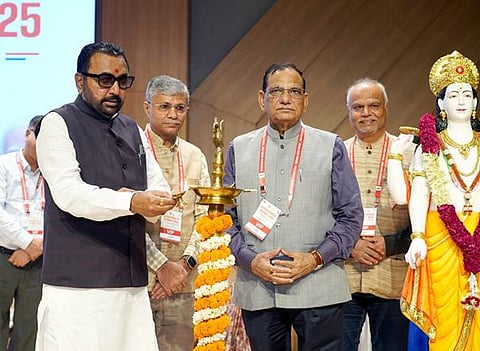

Union Minister of State (Independent Charge) of Ministry of Ayush, Shri Prataprao Jadhav inaugurated today the Departmental Summit on 'National Ayush Mission and Capacity Building in States' at All India Institute of Ayurveda, Sarita Vihar, New Delhi in august presence of Member NITI Ayog, Dr. Vinod Kumar Paul and Secretary, Ministry of Ayush Vaidya Rajesh Kotecha.
Speaking on the occasion, Union Minister Shri Jadhav emphasized the Government’s commitment to building a resilient and inclusive healthcare framework tailored to state-specific needs. Shri Jadhav highlighted the Government’s approach to develop comprehensive standard operating procedures (SOPs) for enhancing healthcare delivery across the country. “Our aim is to create state-specific frameworks, develop comprehensive SOPs to build better health infrastructure, provide quality services to the people, and ensure the integration of Ayush with modern health systems,” he stated.
Reflecting on the progress of the National Ayush Mission since its inception in 2014 under the visionary leadership of the Prime Minister, the Minister noted that the mission has significantly advanced affordable and inclusive Ayush healthcare services. He particularly underlined the transformative initiative of establishing 12,500 Ayushman Arogya Mandirs across India, marking a paradigm shift from OPD-based services to a holistic service delivery model with a focus on preventive and promotive healthcare.
He further informed that on March 4, 2024, the Ministry launched the Indian Public Health Standards (IPHS) for Ayush health care facilities. These standards, developed in consultation with NITI Aayog and the Directorate General of Health Services (DGHS), are a milestone towards ensuring uniformity and quality in Ayush infrastructure, human resources, capacity building, medicines, quality assurance, clinical trials, and branding.
In a significant announcement, Shri Jadhav declared that Ayurveda Day will now be celebrated every year on September 23rd, with the 10th anniversary being observed this year under the theme "Ayurveda for People and Planet". This theme underscores Ayurveda’s relevance in promoting individual well-being while ensuring ecological sustainability. He urged all States and UTs to actively participate and work collectively to elevate Ayurveda Day into a global health initiative.
On the institutional development front, the Minister announced the operationalization of the Project Management Unit (PMU) at All India Institute of Ayurveda (AIIA) to assist stakeholders on Ayush-related insurance matters. The PMU will serve as a dedicated interface for facilitating access to Ayush treatment through insurance mechanisms.
He also inaugurated the ‘Ayurvidya Advanced Centre’ at AIIA — a pioneering digital platform dedicated to Ayurveda education and communication. The Centre aims to democratize Ayurveda learning through expert-led courses, live webinars, and interactive sessions. The initiative is expected to play a key role in capacity building, continuing professional development, and fostering innovation in the Ayush sector.
Addressing the gathering, Dr. V. K. Paul, Member (Health), NITI Aayog, emphasized the critical role of the Ayush sector in building a Swasth Bharat while addressing the Ayush Summit. He highlighted that the summit brings together stakeholders and State Governments on a single platform to deliberate on strengthening traditional health systems across the country. He acknowledged that the vision of Viksit Bharat @2047 can only be realized through a healthy and productive population, adding, “Health is both an enabler and a milestone for national development.”
He noted India’s significant strides in combating acute diseases and achieving SDG targets, with focused efforts under the leadership of Prime Minister Shri Narendra Modi to eliminate diseases like Tuberculosis, Leprosy, Lymphatic Filariasis, Measles, Kala Azar, and Rubella. Dr. Paul stressed the importance of increasing life expectancy from the current 71 years to 85 years or more, through a comprehensive, integrated approach that includes both modern and traditional healthcare systems.
To achieve this, he outlined key action points including better implementation of the National Ayush Mission (NAM), strengthening Ayush medical education infrastructure, promoting wellness and medical value tourism, and encouraging greater participation of the Ayush private sector and trained workforce. He called for collective and sustained efforts to mainstream Ayush for improved national health outcomes.
Secretary, Vaidya Rajesh Kotecha emphasized the need to take the ‘Har Ghar Ayuryog’ initiative — a blend of Ayush and Yoga — to every household, as it plays a vital role in creating a healthier nation. He added that the two-day Summit, built around six key sub-themes, aims to drive this integration through behavioral change and will contribute significantly to the effective implementation of Ayush policies.
The summit aims to provide a platform for detailed discussions on State-Specific Notes and Feedback Notes received from State/UT officials, which also encompass grassroots-level inputs. Such a participatory approach is intended to strengthen and strategically expand the National Ayush Mission (NAM)—a flagship program that promotes holistic healthcare by integrating Ayurveda, Yoga & Naturopathy, Unani, Siddha, Sowa Rigpa and Homeopathy systems.
Senior bureaucrats from States and UTs participated and presented their findings on allocated themes and state specific and feedback notes collected from grass root stakeholders.